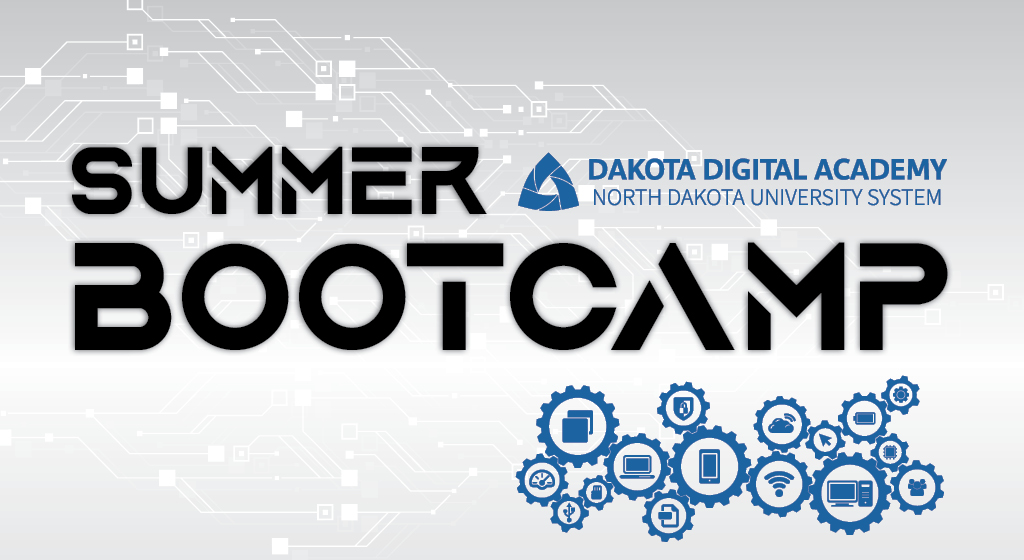2023 Summer Bootcamp: June 6-7, 2023
The Dakota Digital Academy two-day bootcamp will be designed to highlight the fun and creative aspects of digital technologies. Upon completion, participants will be provided with a syllabus and a technology toolbox to bring back to their classroom and engage their students.
The four-module set will feature networking, Internet of things, cybersecurity, and programming. A $200 stipend will be provided to each participant and graduate credit will be available through Minot State University or Valley City State University.
Registration deadline is May 31st, 2023.

The event will be offered at six locations across the state. Space is limited!
- Dakota College at Bottineau
- Lake Region State College
- Minot State University
- Turtle Mountain Community College
- Valley City State University
- Williston State College
Module 1: Networking
Network security is critical and a lack of understanding it is frustrating. Many time we wish that things were a little simpler.
If you and your students are considering a career in information technology, it is important that you understand the basics of networking and network security, including how you can protect yourself and others from harmful cyber attacks.
This workshop will focus on the networking concepts with hands-on building a small network to better understand the value and visit about vulnerabilities. Also we will take a look at network traffic to better identify what is happening behind the scenes.
You will be given resources to better help you to continue understanding networks and tools for your students and the general public.
Module 2: Cybersecurity awareness
- What is Cybersecurity & Importance of Cybersecurity Awareness
- Protecting Personal Information by understanding Password Management and Phishing Attempts
- Safe Social Media Use and Secure Mobile Device Management
- And much more….
- Password Cracking using John the Ripper
- How Secure is your Password Activity
- Port Scanning using Nmap/ZenMap
- Analyze Network Packets using Wireshark
- Phishing Attack Activity
- Incident Response Plan Activity
module 3: Internet of things
Internet of Things (IoT) is growing fast. From smart homes to industrial automation, IoT is penetrating into every area of our life and changing the way we control objects and processes around us. Gear up k-12 students with IoT fundamentals and skills to set them up for success in the fast-changing world! IoT combines the deployment of electronic devices such as sensors, controllers and actuators and connecting them into a network through the Internet with the purpose of operating equipment remotely, collecting and analyzing data, and receiving important notifications in real time. All this can be done on mobile devices like your cell phone remotely from anywhere in the world! This 4-hour session will cover all the fundamental topics and activities you need to start your own Internet of Things class at your school. We will use hands-on equipment and simulators – from basic circuitry, electronic control technology, to sensors and cloud networking to build your first IoT project from scratch. You will take home a basic IoT kit and a sample curriculum to help you take your class offerings to a whole new level.
module 4: programming
Join us for a hands-on, 4-hour course where you’ll have the opportunity to learn an easy way to program and build an autonomous project. All necessary devices and related components will be provided – just bring your laptop and a passion for learning. You will develop a basic understanding of the basics of electronics hardware, including the components of an Arduino board, input and output devices, and the function of the CPU, RAM, and storage. Fundamental programming skills such as working with variables, controlling flow, defining functions, and Arduino software structures will also be covered. You will learn how to write and debug code using the Arduino Integrated Development Environment (IDE), and how to communicate with other devices. Furthermore, you will explore integrating your code with libraries to enhance your project capabilities.
By the end of the course, you will be able to:
- Grasp the basic technology of electrical circuits and the Arduino board
- Choose the appropriate Arduino device for your needs
- Set up the Arduino development environment
- Write programs to control Arduino devices and other components
- Troubleshoot software issues and identify hardware problems
- Design Arduino projects to meet specific requirements
